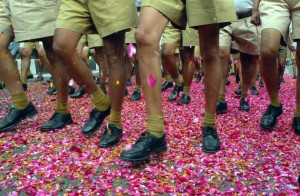 By Mohit Dubey
By Mohit Dubey
Since Narendra Modi became the prime minister in May, the Rashtriya Swayamsewak Sangh (RSS) has been merrily expanding its network in populous Uttar Pradesh.
In recent months, the RSS — founded in 1925 and traditionally weak in the sprawling state — is focussing on widening its influence among Dalits and in the countryside.
The RSS has also launched a membership drive and taken to social networking and the virtual world in a big way.
And the dividends have begun to trickle in.
The number of ‘shakhas’ of the RSS — where members, old and new and young and old, meet for regular morning and evening exercises — in Uttar Pradesh has risen to about 8,500 almost dramatically.
A senior RSS functionary overseeing the membership drive through the ‘Join RSS’ campaign started on its web site says the group gets 200 to 250 responses every day. Some want to know more about the RSS.
“The RSS has being doing great work for decades. But we admit that it is only after our open support to Modi and the BJP that people, specially the young, has recognized our worth and are taking us seriously,” the official in the group told IANS.
The ‘shakhas’ now get a fair sprinkling of youngsters, he added.
With almost a 8-10 percent growth in membership in the state in the past few months, the RSS has set a target of 15 percent increase in activities.
After reaching every block across the sprawling state, the RSS is trying to make inroads into the 8,000-odd Nyay Panchayats in the countrywide.
The Sangh has roped in affiliates like the Vishwa Hindu Parishad (VHP) and Akhil Bharatiya Vidyarthi Parishad (ABVP) to target universities and other educational institutions, a source told IANS.
“Whats wrong in it? RSS is a nationalist organization and not a terror outfit,” said Santosh Pathak, a sympathiser here.
The RSS, outlawed thrice since India’s independence in 1947, is the ideological mentor of the Bharatiya Janata Party. Many BJP veterans, Modi included, began their public life in the RSS.
Simultaneously, the VHP has begun a new drive to reach out to the Dalit community, which accounts for a substantial chunk of the population in Uttar Pradesh.
VHP leaders and activists have dined with Dalits at their homes. Upper caste families have also invited Dalits to their home for food.
The aim is to shatter the widely held notion that Hindu rightwing groups are biased towards the upper caste and anti-Dalit.
The VHP’s aim is to consolidate the exodus of Dalits, OBCs and others to the BJP fold during the May general elections.
RSS leaders say they have set their eyes on the Gandhi strongholds of Amethi and Rae Bareli – the constituencies represented in the Lok Sabha by Congress leaders Rahul Gandhi and Sonia Gandhi respectively.
The ABVP has been told to form units in all inter colleges of the region, largely with a view to “catch them young”.